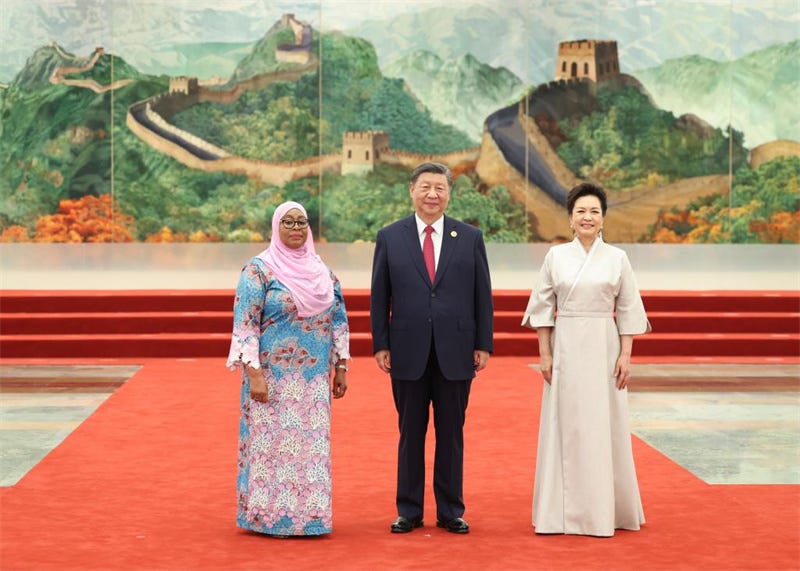China Upgrades Bilateral Relations in Africa
China-Africa Summit Marks African Countries Designated As “Strategic Relationships”

The ninth Forum for China-Africa Cooperation (FOCAC) or the China-Africa Summit opened on Thursday 5 September at the Great Hall of the People at Beijing. In the inaugural address the Chinese President Xi Jinping announced to upgrade all existing relations with African countries to the level of “strategic relationship.”
During his address, Xi claimed that modernization is the right of all countries in the world. He criticized the Western approaches to modernization which, according to him, are based on domination causing immense sufferings on developing countries. He, instead, proposed a mutual approach to modernization in order to build a prosperous future for both China and Africa.
The proposed approach to modernization would be “just and equitable,” featuring and respecting all kinds of “diversity and inclusiveness” and is eco-friendly. “China and Africa’s joint pursuit of modernization will set off a wave of modernization in the Global South, and open a new chapter in our drive for a community with a shared future for mankind,” Xi said.
This year’s theme of the summit, which is also known simply as “Forum” is “joining hands to advance modernization and build a high level China-Africa community with a shared future.”
Out of the 54 countries on the African continent, delegations or leaders of 53 countries are participating in the summit. UN Secretary General Antonio Guterres joined the summit as a special guest, and heads of several other international organizations, including the African Union (AU), are also participating in the summit as observers.
According to the Chinese Foreign Ministry, the Forum which concluded on Friday is the “largest diplomatic event” in the country in the last few years and that most of the countries are represented by their head of states.
The summit was first formed in 2000 and held every three years. It is basically designed as a platform to develop cooperation between China and African countries in areas such as economic and trade development, including the Belt and Road Initiative (BRI) and security cooperation.
It has gradually become the principal instrument to govern the relations between China and African countries.
“Thanks to nearly 70 years of tireless efforts from both sides, the China-Africa relationship is now at its best in history,” Xi said in his inaugural address. He proposed to elevate all bilateral relationships with African countries, “to the level of strategic relations, and that the overall characterization of China-Africa relations be elevated to an all-weather China-Africa community with a shared future for the new era.”
China-Africa relations at its best
China has diplomatic relations with all the countries on the continent except eSwatini, aka Swaziland, which does not adhere to “one China policy” and has diplomatic ties with Taiwan.
China has invested heavily in infrastructure development in the African continent through its Belt and Road Initiative (BRI). It has been the African continent’s biggest trading partner since 2009. They had a mutual trade of USD 282 billion in 2023. There is a proposal to raise it further to over USD 300 billion in the coming years.
Data from China’s Ministry of Commerce shows that Chinese companies created over 1.1 million jobs in the last three years alone, Xinhua reported.
Chinese engagements in Africa have become a major concern for the West which has a long history of colonial occupation and imperialist intervention and see China as a threat to their interests in the region. There has been an attempt by the West to portray the Chinese attempts to fund development projects in the region as a “debt trap” for African countries. China rejects has rejected such accusations, claiming the relationship between China and Africa is based on mutual respect and cooperation. The Chinese Foreign Ministry had earlier asserted that in its 24 years long history of FOCAC, the forum “has always adhered to the principles of planning together, building together and benefiting together.”
During his address on Thursday, Xi offered to implement 10 partnership action plans to jointly advance modernization with African partners. These 10 partnership plans include programs related to mutual learning, exchange of knowledge and values, trade prosperity with special focus on least developed countries in the region, industrial chain cooperation by “working together on personnel training, poverty reduction and employment” and greater technological exchanges.
Xi proposed to make greater investments in building better connectivity projects across the continent and to China under high quality BRI projects, development cooperation by initiating thousands of small livelihood projects, cooperation in the sectors such as health, agriculture and livelihoods, programs to have greater people to people and cultural exchanges and green development under its Global Development Initiative (GDI).
He also promised better trade relations and market access for all “least developed countries” (LDCs), including 33 countries in Africa, “China will voluntarily and unilaterally open its market wider. We have decided to give all LDCs having diplomatic relations with China…zero-tariff treatment for 100 percent tariff lines.”
Xi proposed fresh assistance worth USD 51 billion for African countries to run and develop some of these programs in the next three years. He also promised creation of a million more jobs in the same period.
China has also proposed to enhance the common security approach by assisting the African countries to improve their capacity to safeguard peace and stability without being reliant on external forces under its Global Security Initiative (GSI).
As of now, the US and several European countries have military presence on the continent which often threatens the independence of countries, their stability, and peace.



